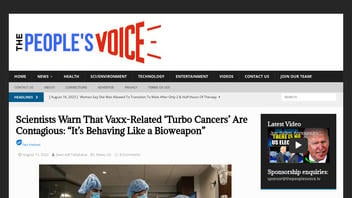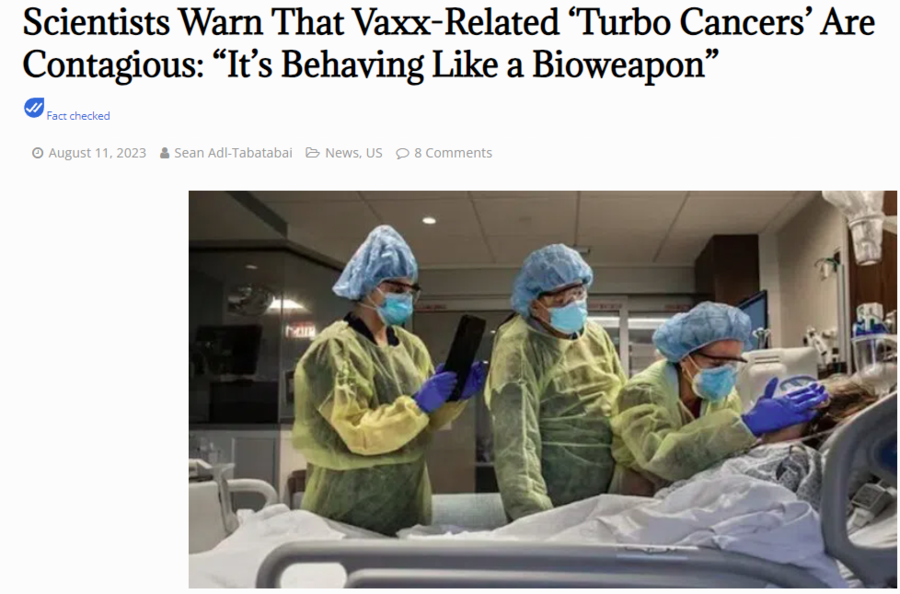STORY UPDATED: check for updates below.

Are COVID-19 vaccine-related "turbo cancers" real? Are they also "contagious" and "behaving like a bioweapon"? No, that's not true: There is no serious evidence for the claim that COVID vaccines cause "turbo cancers." Cancer is complex and has many causes.
Additionally, the thought that cancers could be contagious or act like bioweapons lacks support from credible science. Vaccines help the immune system fight specific infections and cannot make cancers contagious or act as bioweapons.
The claims appeared in an article (archived here) published by The People's Voice on August 11, 2023, titled "Scientists Warn That Vaxx-Related 'Turbo Cancers' Are Contagious: 'It's Behaving Like a Bioweapon.'" The article opens:
Scientists are warning that vaccine-related 'turbo cancers' appear to be contagious and are spreading from vaccinated individuals to the unvaccinated.
This is what the post looked like on The People's Voice website at the time of writing:
(Source: The People's Voice screenshot taken on Wed Aug 16 14:59:08 2023 UTC)
What is 'turbo cancer'?
The People's Voice article bandies about the term "turbo cancer" as if it's a recognized term in mainstream medicine or science. It's not. A Lead Stories search for "turbo cancer" in the U.S. National Library of Medicine, the world's largest biomedical library, didn't return any results.
Dr. David Gorski, a surgical oncologist with the Cancer Biology Program at Wayne State University's School of Medicine, dismissed the notion of "turbo cancer" in an article published December 19, 2022, in Science-Based Medicine called "Do COVID-19 vaccines cause 'turbo cancer'"? He said:
Over the last several months, antivaxxers have been claiming that COVID-19 vaccines cause 'turbo cancer', cancers (or cancer recurrences) of a particularly aggressive and fast-growing variety diagnosed in younger and younger patients. 'Turbo cancer' is not a thing, and the evidence cited is as weak as any antivax 'evidence', including anecdotes and misinterpretation of epidemiology.
Food and Drug Administration
The U.S. Food and Drug Administration (FDA) told Lead Stories in an August 16, 2023, email that there's nothing to support the cancer claim in the article. Cherie Duvall-Jones, a press officer at the FDA, provided the agency's response. It said:
Extensive monitoring of adverse events reported after vaccination with authorized and approved COVID-19 vaccines to the Vaccine Adverse Event Reporting System (VAERS) does not show a safety signal for any type of lymphoma or other cancers, including aggressive tumors.
COVID-19 vaccines have undergone--and continue to undergo--the most intense vaccine safety monitoring in U.S. history. The FDA and CDC [Centers for Disease Control and Prevention] stand firmly behind the safety and effectiveness of the mRNA COVID-19 vaccines, which are fully supported by the available scientific data. Staying up to date on vaccination is the best way to reduce the risks of death and serious illness or hospitalization from COVID-19, in addition to providing a modest benefit in the prevention of infection.
The evidence is overwhelming that the benefits of vaccination against COVID-19 clearly outweigh the risks. However, like every other medical intervention, there are potential adverse effects from vaccination. Reports of death or serious adverse events from COVID-19 vaccines are rare and are far outweighed by the benefits of these vaccines for every age group.
Vaccine Adverse Event Reporting System
In the United States, VAERS, which the CDC co-sponsors with the FDA, operates as a crude early warning system and not as a database for the quantification of specific outcomes following vaccination.
Anyone with internet access can add a report to the VAERS list of reports. The public access link to it expressly warns against unwarranted conclusions based on VAERS material because the list only provides a tally of unverified notes about any health event people experience after they are vaccinated.
The list itself cannot be used to prove or quantify, since all it shows is a chronological correlation, not the causal link that would be more difficult to establish. It's the equivalent of a police precinct's running "blotter" reports that may serve as a starting point for police work, not an endpoint.
Centers for Disease Control and Prevention
The CDC's Immunization Safety Office told Lead Stories in an August 17, 2023, email that "There is no evidence to date indicating that COVID-19 vaccines cause cancer of any sort (including so-called "turbo cancers")." The agency's response continued:
The authorized and approved COVID-19 vaccines are being administered under the most comprehensive and intensive vaccine safety monitoring effort in U.S. history. Monitoring involves multiple complementary ongoing systems ... . After more than 676 million doses administered, safety monitoring has not established an association between COVID-19 vaccination and an increased risk for any cancers. There are no data that suggest that COVID-19 vaccines cause cancer, lead to recurrence, or to disease progression. Furthermore, COVID-19 vaccines do not change your DNA (i.e., your genetic code). ...
CDC does not understand what is meant by 'bioweapons,' but there is no evidence COVID-19 vaccines have been used as an agent of biological warfare. ...
In sum, there's no evidence to support the allegation that COVID-19 vaccines are transmissible person-to-person.
The CDC says more information is available on these topics from the National Cancer Institute, which says:
There is no evidence that COVID-19 vaccines cause cancer, lead to recurrence, or lead to disease progression. Furthermore, COVID-19 vaccines do not change your DNA (i.e., your genetic code).
Memorial Sloan Kettering Cancer Center
The Memorial Sloan Kettering Cancer Center calls the idea that mRNA vaccines can cause cancer a myth. The hospital's website says:
None of the vaccines interact with or alter your DNA in any way, and therefore cannot cause cancer.
Messenger RNA (mRNA) is not the same as DNA and cannot be combined with DNA to change your genetic code. Here's now mRNA vaccines actually work:
The mRNA vaccines use a tiny piece of the coronavirus' genetic code to teach your immune system how to make a protein that will trigger an immune response if you get infected. The mRNA is fragile and it delivers the instructions to your cells to make antibodies against SARS-CoV-2. The mRNA does not enter the nucleus of the cell -- the part that contains your DNA.
Therefore, there is no truth to the myth that somehow the mRNA vaccine could inactivate the genes that suppress tumors.
'Contagious' and 'It's Behaving Like a Bioweapon'
Despite appearing prominently in the headline of The People's Voice article, the word "contagious" and the quote "It's behaving like a bioweapon" are scarcely seen in the story itself. No one in the article says the bioweapon quote. It only shows up in the headline. "Contagious" only appears in the headline and the first line of story.
COVID vaccines don't spread from person to person. They're not "contagious" or "behaving like a bioweapon" as The People's Voice article suggests, moving from one human being to another. The concept is referred to as vaccine-shedding. It circulates often enough in anti-vaccine and vaccine-hesitant circles that the CDC has included it among its list of "Myths and Facts about COVID-19 Vaccines." The page on the CDC website reads:
MYTH: COVID-19 vaccines authorized for use in the United States shed or release their components.
FACT: Vaccine shedding is the release or discharge of any of the vaccine components in or outside of the body and can only occur when a vaccine contains a live weakened version of the virus.
None of the vaccines authorized for use in the U.S. contain a live virus. mRNA and viral vector vaccines are the two types of currently authorized COVID-19 vaccines available.
Pfizer
In an email dated August 17, 2023, to Lead Stories, Pfizer, one of the makers of the COVID vaccine, provided the following response to The People's Voice story. It said:
Cancer has not been identified as a signal or a risk of the vaccine.
The Pfizer-BioNTech COVID-19 Vaccine is a synthetic mRNA vaccine and does not contain any virus particles. Because there is no virus produced in the body, no shedding occurs within the human body. The vaccine cannot be inhaled via shedding and can only enter the human body through an administered dose.
About The People's Voice
The People's Voice is among the most prolific online publishers of fake news. It started as YourNewsWire in 2014 and rebranded as NewsPunch in 2017. NewsPunch has published numerous fake news articles in the past, so anything it publishes should be taken with a large grain of salt. Its Facebook page, "The People's Voice," lost its verification checkmark, according to a 2018 report from Media Matters For America.
Read more
Additional Lead Stories fact checks of claims related to vaccines can be found here.
Other Lead Stories fact checks on stories by The People's Voice can be found here.
Updates:
-
2023-08-17T15:49:34Z 2023-08-17T15:49:34Z Adds Pfizer response to COVID vaccine cancer claims. Adds CDC response.


















